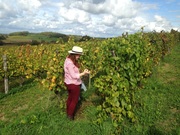|
I was at a wine trade tasting this week and heard the man next to me ask, "Biodynamic wine? So is it really true? They use a cow horn to make wine?"
This is an expected comment whenever people talk about biodynamics. I've heard "the horn comment" dozens of times. I just finished an internship at a biodynamic vineyard so I have hands-on horn experience. At the tasting, I chimed in to explain it the horn mystery, and now he doesn't think biodynamics is so crazy. #myworkhereisdone I'm going to explain why the horn isn't such a crazy idea. The Horn Sounds Like a Weird Idea
First, I'm going to confirm the rampant skepticism. It's a little strange to hear that a cow horn has a role in the vineyard. It sounds like voodoo. We are used to buying gardening supplies at big box stores, and using commercially-made fertilizers. Farming and gardening is a hard science that you learn about at the university. All you need is a big, red tractor and a machine harvester and you can get the job done, right? How on earth does a horn make sense, compared to these solid options?
You may have wondered:
Why is someone burying a horn in their vineyard? Does it have something to do with worms? Why can’t a plastic or glass container be used instead? Why would a buried horn have any remote effect on the grapes? Shouldn’t we stop acting like superstitious, medieval peasants? If no one knows the answers to these questions, it breeds skepticism and mistrust... Why We Cannot Ignore the Horn
Biodynamics is a vast practice that can be used for practical farming purposes with or without the occultist beliefs. There are divisions in the biodynamic culture between the practically minded and the spiritually minded. I met a biodynamic farmer from Sacramento who started to use biodynamics for practical reasons only (he wanted to move away from chemical use), but over years of observing its effects, he began to believe in the energetic effects more than he initially expected to.
Writing off a subject because it sounds silly doesn’t help anyone. History has proven that hating something you don't understand is a bad move. Our world is in dire need of sustainable farming practices that don't poison the soil. Humans are in need of food options that don't cause disease. Like many sustainable farming practices, biodynamics has an important role to play in this game. What the Horn Does
The cow horn is a vessel used for two things:
1. Preparation 500: To ferment cow manure, turning it into a "super manure" that plants and soil critters love. 2. Preparation 501*: To store ground up quartz crystals. The crystal dust is mixed with water and later sprayed onto leaves to promote photosynthesis and to combat fungal infections. *I'm gonna be honest here: I know that 501 is super effective on plants, but I don't understand the reason why 501 has to be stored in the horn (other than occultist reasoning). If someone out there knows why the horn is a practical vessel for 501, please tell me! Why the Horn Cannot Be Replaced
A cow horn is full of enzyme deposits which are essential for Prep 500 to ferment. A plastic or glass container won't work (it has been attempted, even by famous vigneron, Nicholas Joly).
Why are there enzymes in the horn? The horn is a semi-hollow part of a cow’s skull and cartilage. The cavities in the horn connect with the sinuses and the mouth. A cow chews its cud...a lot. These enzymes flow through the cow’s mouth, nose, sinuses, and horn cavities while the cow chews and breathes. By the end of the cow’s life, there are a lot of digestive enzymes stored up in those horns. This is why a glass or plastic container won’t suffice. They are empty; devoid of enzymes. Why the Horn is Buried
To ferment 500, the horn is buried so that the manure will react with the enzymes and start to ferment. Much like a wine cave, the underground soil is temperature is controlled between 58-62 degrees. This allows the manure to slowly ferment inside the horn. The horn is buried in the fall and dug up in the spring.
Additionally, the shape of the horn allows for moisture to drain out (it is buried with the point sticking up) and traps nitrogen in the tip of the horn. Spraying 500 and 501 onto the Farm
When unearthed, 500 and 501 go through the same process.
The farmer will take a tiny bit of the horn contents (it is very potent stuff) and stir it into a bucket of water for an hour. The remaining horn contents are stored in a cool, dark place (like a wine cave) for future use. One horn's contents can be used many, many times. Biodynamic farmers will wax poetically about stirring. They love to stir preps in water. An hour of stirring really becomes quite meditative. It reminds me of bartenders talking about the perfect shake. There is a perfect rhythm. You have to get everything really well integrated, and the stirring creates a lot of microbubbles and froth. Once stirring is done, the farmer will spray 500 lightly onto the soil in the fall. She will spray 501 onto plant leaves in the spring. Results of 500 and 501
This 500 preparation has been proven to increase soil bacteria, humus content, and worm life. Farmers who convert their farm from conventional/ chemical farming methods to biodynamic methods must use 500 for several years before the soil health and diversity begins to come back. Conventional/chemical farming kills soil life. Commercial fertilizers are made out of petrochemical by-products. What kind of plant would want to eat that??
The 501 preparation is used to promote photosynthesis. Therefore, it is used in small doses in sunny regions and is used more often in very polluted or cloudy regions. Quartz crystals reflect light. It is a very easy method to increase photosynthesis. Additionally, it helps to prevent fungal infections in wet regions. Horn Mystery: Solved?
So that’s the great mystery of the horn. Is it as strange as it first sounded? Or does it make sense?
What I have written here barely scratches the surface of biodynamics. I'm fascinated by biodynamics and very grateful that such a massive amount of folk wisdom has been preserved in it's teachings. All in all, the horn deserves some respect. It’s proven to keep the soil healthy and alive, and it keeps plants making chlorophyll. Who can argue with that?
0 Comments
Leave a Reply. |
AuthorMy name is Floreana and I'm a sommelier. I think that natural wine is the shit. I also think that sustainable farming might just save the world. Categories
All
Archives |


 RSS Feed
RSS Feed
